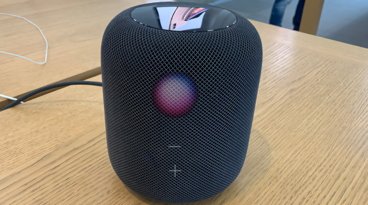Apple's PA Semi buyout motivated by assets, not products
Despite speculation that Apple's acquisition of PA Semiconductor was motivated by the chip maker's specific products, a new report reveals that the iPhone designer is interested more in the buyout for its promises of intellectual property and development expertise — and may be causing a crisis for the US Department of Defense in the process.
Instead, the buyer (since identified as Apple) is focusing on more abstract intellectual developments and engineering staff, leaving the door open to the use of Intel's Atom platform for future Apple designs.
PA Semiconductor is best-known for developing very high efficiency embedded processors, such as a dual-core, 64-bit PowerPC-based chip that runs at 2GHz but uses only 15 watts of power. While the product itself no longer useful to Apple, which has switched all its computers to Intel's x86 architecture, the achievement itself has drawn attention from since its launch in February of last year by outperforming other rivals in the field while simultaneously running more efficiently.
Nonetheless, Apple's takeover may leave many of those customers — and the US military — hanging out to dry, according to an unnamed employee of one of the affected firms.
Though still considered a startup company, PA Semiconductor has already encountered unprecedented success in selling its products and is heavily invested in military technology. More than 10 defense devices, including some from Lockheed Martin and Raytheon, already use the young electronics firm's PWRficient processor to varying levels across every branch of the US armed forces. This bucks conventional industry wisdom, which hesitates to use brand new technology until well-tested.
"I've never seen such fast adoption of a product in the [military aerospace] world," the alleged insider says.
Apple, however, is said by PA Semi to be uninterested in continuing development of those chips and may farm out production on end-of-life terms only if it can transfer a third-party technology license. That will leave many of the smaller company's present-day customers without a long-term source of parts and is already seen as problematic for military contractors like Raytheon, which often spend "many" years developing and maintaining combat equipment.
The risk of an abrupt processor supply cutoff is also reportedly enough that the US Department of Defense may be compelled to plead its case to Apple. No intervention is currently underway, but one is described as possible should PA Semi's customers, and thus DoD part suppliers, grab the attention of the government branch.
"We've had customers saying they are going to the DoD on this one," the source claims.
For its part, Apple remained silent on the reasoning and effects of the acquisition during its second-quarter conference call.
 Katie Marsal
Katie Marsal













 Amber Neely
Amber Neely
 Thomas Sibilly
Thomas Sibilly
 AppleInsider Staff
AppleInsider Staff
 William Gallagher
William Gallagher
 Malcolm Owen
Malcolm Owen
 Christine McKee
Christine McKee









105 Comments
I personally think they bought them because of the fish.
Though still considered a startup company, PA Semiconductor has already encountered unprecedented success in selling its products and is heavily invested in military technology. More than 10 defense devices, including some from Lockheed Martin and Raytheon, already use the young electronics firm's PWRficient processor to varying levels across every branch of the US armed forces.
Now every soldier, sailor, marine and airman will have their own tactical communications & media device.
Think iPhone with satellite & uhf comms, thermal & infrared camera and maps.
Ability to locate everyone and send messages to individuals/groups directing movements at the lowest level needed.
If captured or the phone is lost, it can be erased remotely.
Movies, music, email, websurfing, etc. when on downtime.
Perhaps this chip will be at the heart of a future Newton/Tablet device....
or the 5G iPhone :<>
All I can say is that if Apple *doesn't* cut itself off from the war industry, I won't be buying another Apple product ever. I know lots of other people probably feel the same.
All I can say is that if Apple *doesn't* cut itself off from the war industry, I won't be buying another Apple product ever. I know lots of other people probably feel the same.
Are you confident that Apple doesn't already sell to the "war industry"?